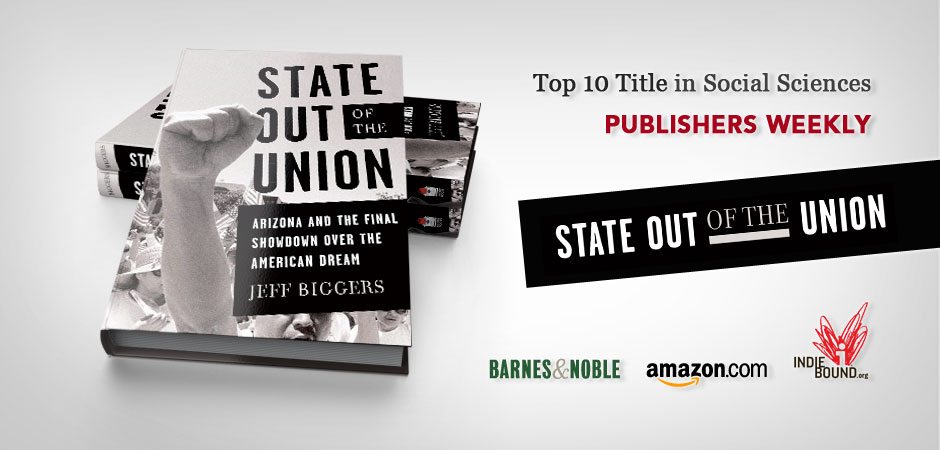During the past few years, it’s been easy for some to ask: What is the deal with Arizona?
Or, more specifically, what is the deal with that sheriff? With banning books — Shakespeare, really? With the racist SB 1070, which requires anyone who might not look right to carry proof of citizenship or legal residency? With the governor wagging her finger in the President’s face?
From the outside, Arizona can appear to be a place speaking with one fanatical voice. But it’s not, Jeff Biggers says in State Out of the Union: Arizona and the Final Showdown Over the American Dream. Recently named a Southwest Book of 2012 and a Top Ten 2012 Social Science Title by Publisher’s Weekly, State Out of the Union not only investigates Arizona’s past decade of political turmoil, but also reveals a struggle to reclaim the state from carpetbaggers and political opportunists.
Biggers starts with an image of Attorney General Eric Holder, former Arizona governor and current director of Homeland Security Janet Napolitano, Arizona Governor Jan Brewer, and President Barack Obama all gathered in the McKale Memorial Center in Tucson days after a tragic shooting Jan. 8, 2011, in which six were killed and 13, including Arizona Congresswoman Gabrielle Giffords, injured.
Almost immediately, Biggers orients the reader into the surreal world of Arizona politics. As Obama beseeched the McKale and national viewing audience to “come together” and “reflect,” Arizona state Sen. Russell Pearce, the so-called architect of SB 1070, was busy ramrodding bills through his Tea Party legislature, obliviously declaring the Colt Single-Action Army Revolver as the state gun and providing state financing for the official “Don’t Tread on Me” license plate.
To provide context, State Out of the Union examines the state’s tumultuous road to statehood. Biggers describes the route from the creation of a state constitution once so progressive it stood in the way of ratification to the eventual manipulation of the fledgling state legislature by out-of-state interests and interlopers.
He then places politicians like Jan Brewer (from California), Joe Arpaio (from Massachusetts) and Tome Horne (from Canada) in the tradition of political outcasts and opportunists looking to remake themselves in the Arizona desert.
The book is written in a strident, but not alarmist, tone. Biggers does his best work when documenting the struggles and victories of everyday Arizonans. He tells of community organizer Randy Parraz, who led the successful recall of Russell Pearce, the state senator who was the primary sponsor of SB 1070. He details the ongoing community struggle to allow the topic of Mexican-American Studies back in Tucson public schools.
Perhaps the biggest revelation in State Out of the Union is that what happens in Arizona (and in the Southwest, for that matter) has a ripple effect on the rest of the country. Other states have adopted anti-immigrant legislation and empowered a culture of fear, ignorance and racism at the local level. But as in Arizona, community members and activists are fighting back.
As the country struggles to deal with immigration, civil rights and what it means to be an American, State Out of the Union serves as a guide to the cultural showdown that now seems inevitable.
***
Matt Mendez’s stories have appeared in Cutthroat, Huizache, The Literary Review, and other journals. His first book, Twitching Heart, is available from Floricanto Press. Contact him at mattmendez.com.



